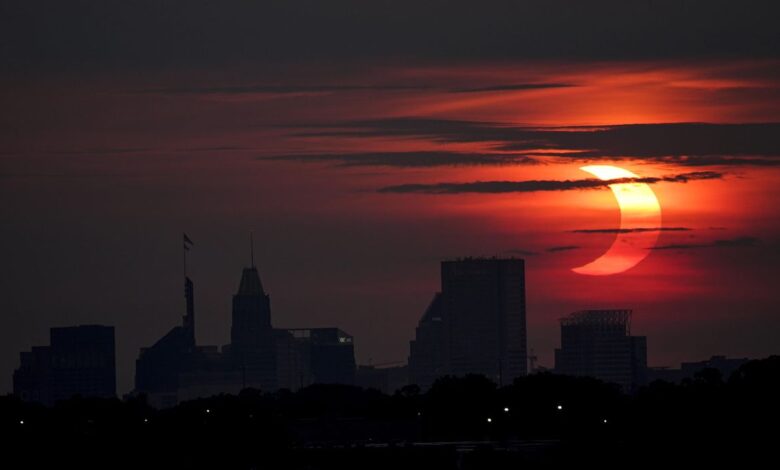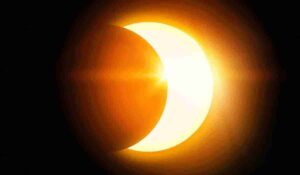
Partial Solar Eclipse 2023, Partial Solar Eclipse 2023, The next total solar eclipse visible from Earth will occur on April 8, 2024. This eclipse will be visible from parts of North America, including Mexico, the United States, and Canada.
Partial Solar Eclipse 2023
However, there will also be a partial solar eclipse visible from parts of Australia, New Zealand, and southern parts of South America on October 14, 2023. This eclipse will not be as significant as a total solar eclipse, but it will still be an exciting astronomical event for those in the viewing areas.

Partial solar eclipse observation
Observing a partial solar eclipse requires special eye protection because of the amount of sunlight that is still visible. During this event, the moon’s shadow only partially blocks the sun, resulting in a crescent shape. Safety should always be a priority when viewing any type of solar eclipse.
Partial eclipse timing
The visibility and timing of a partial solar eclipse will depend on the location. Australians can expect to experience this celestial event from sunrise, as it moves west. In New Zealand, luckier viewers will see the onset of this eclipse around midday.

Watch the eclipse in Chile and Argentina
Residents of the Southern Hemisphere, including Chile and Argentina, will have the opportunity to see a partial solar eclipse near sunset on a given day. Although it will not be as amazing as a total solar eclipse, it is still an amazing event that should not be missed. To be able to enjoy this rare spectacle safely and without permanently damaging your eyes, make sure you have adequate protection, such as special vision sunglasses or a solar filter for telescopes/cameras, before looking at the sun. Regular sunglasses or household filters do not provide adequate protection against the sun’s harmful rays.
safety precautions
A total solar eclipse is an exciting event to watch and it is essential to take appropriate safety precautions. It is not safe to directly view the sun or eclipse with your eyes, as serious and permanent eye damage can occur. For this reason, experts advise wearing special eclipse glasses or using other safe viewing methods. If you can’t safely view the eclipse due to weather or location, many organizations will broadcast it online so viewers can watch it from home. Enjoy the eclipse!
The danger of eclipses on the retina
The ultraviolet and infrared rays from the sun can burn your retina, which can cause permanent damage known as solar retinopathy. Symptoms may include blurry vision or a central blind spot; These effects can be temporary or long-lasting. Therefore, remember to stay safe and protect your eyes by using only approved eyewear designed to view the eclipse, such as certified eclipse glasses or solar filters/visors. Telescopes, binoculars, cameras, and even ordinary sunglasses do not provide reliable protection against such strong light.

if you experience any symptoms such as eye pain or poor vision after viewing the eclipse with proper protection, seek medical attention immediately. Take care of your precious eyes during this event – you won’t want to miss out on a once-in-a-lifetime experience!
In addition, be sure to only view the eclipse in approved areas and follow local regulations and guidelines. Do not attempt to see the eclipse while driving. Use caution when driving or participating in outdoor activities during the eclipse, as well as before and after it, due to possible traffic and crowds.
Eclipse Vision reserves rules
It is important to take appropriate precautions when observing a solar eclipse. The most important rule: do not look directly at the sun during any part of the eclipse without appropriate glasses. Eclipse glasses, portable solar viewers, and other devices that meet international safety standards must be used for direct viewing of this rare celestial event.
Keep an eye on children and pets, as they are especially susceptible to eye damage. Be aware of your surroundings and practice safe driving habits in case of unexpected traffic or congestion. Finally, avoid looking directly at the sun during the entire eclipse experience—even with appropriate eyeglasses on—by taking regular breaks and resting your eyes often. By following these tips and guidelines, you can safely enjoy this amazing astronomical marvel.
Be careful around open flames, as eclipses can cause changes in lighting that can increase fire hazards.
When viewing the eclipse, it is essential to stay hydrated and protect yourself from the sun’s rays. Wear light clothing and a hat, and use sunscreen frequently. In addition, follow safety regulations provided by local authorities and scientific experts to minimize any accidents or injuries.
Finally, to take pictures of the eclipse, use only approved solar filters attached to cameras or telescopes – never look at the sun through binoculars or other optical devices as they can cause permanent eye damage. If you plan to travel, consider traffic rules and regulations as well as natural habitats and wildlife when distributing






